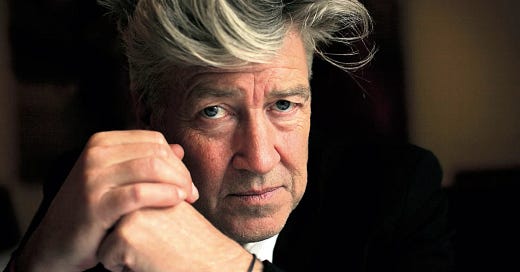Sometimes it’s appropriate to break my once-a-month publication schedule: David Lynch has died at 78. Where to begin?
I watched Mulholland Dr. as a sophomore in college on a weekend when my roommates weren’t around, well after dark for some reason, and have never been more rattled by a movie since. I can remember every encounter with nearly every Lynch that I’ve had: an ill-fated “Blue Velvet and blondies” party, a screening of The Elephant Man I hosted in my first apartment, seeing Lost Highway with some well-to-do friends at the insistence of one who later claimed he “didn’t realize how much of it was sex,” watching The Straight Story and the first season and a half of Twin Peaks with my parents (probably the most they could handle), going to see Fire Walk with Me at the AFI and sensing within 5 seconds that I was going to feel ill for the entire thing, showing up late to Inland Empire at the same venue hoping that maybe I had missed the Rabbits (and instead walking in right in the middle of that segment), watching Twin Peaks: The Return week by week and getting sick halfway through episode 8 but powering through to watch the rest of the episode live anyway.1 And then Lynch’s final cameo as John Ford at the end of The Fabelmans, sort of the ultimate power move on Steven Spielberg’s part, and still one of the most weirdly important movies of my life in the last 5 years (in part because of him).
Everyone in film criticism has a David Lynch story; maybe even most people with any investment in film and TV have one, because his genius and his influence have been inescapable features of the landscape for almost 50 years. The Return is the only work of his that I got to experience when it was released. I hate counterfactuals so I won’t ponder what I would have thought of Eraserhead had I seen it as a bright-eyed college student in 1977. Lynch came to me primarily with received wisdom already baked in (Mulholland Dr. is one of this century’s masterpieces, Fire Walk with Me was unjustly maligned on first release). The Return was a work I had to actively grapple with, as we all did, deciding on a minute-to-minute basis what this revival is worth. The finale aired on the same weekend that friends of mine got married, so I had to figuratively stuff my ears with cotton balls until I could get home to my computer. I’ve had no sinking feeling worse than the one I had getting dragged along by the final episode of (what even then we assumed would be) the final season of Twin Peaks. It’s painfully unfulfilling but necessary viewing, without which the final fifteen seconds wouldn’t be so soul-curdling.
Lynch has many imitators, which speaks well of him, but Lynch himself was not an artist driven by imitation. I bristle against the term Lynchian. What part of Lynch is that word meant to convey? (Surely never the sincere part.) You can just slap it onto anything that’s sufficiently weird by popular standards and nobody’s going to stop you; it’s useful shorthand when you’re just recommending a movie, lazy when you’re trying to write good criticism. So what can I say about David Lynch that’s befitting his singularity? No other director has consistently made me feel more—more fear, more heartbreak, more confusion, even, yes, more joy. In other words, his art has made my life richer. I hope it has made—continues to make—yours richer too.
I still haven’t seen Wild at Heart…and I actually can’t remember where I was when I watched Eraserhead but the feelings are burned into my memory. We’ve already talked about Dune here recently and don’t need to rehash that whole experience.




